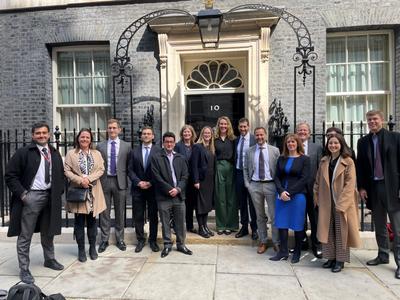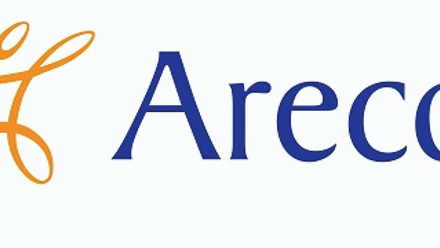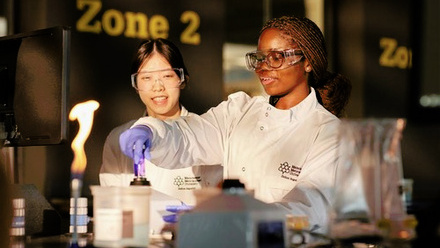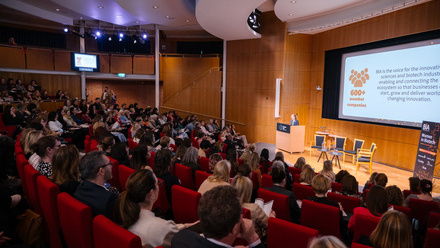CEO Update - 22 April 2024
BIA and our members Extracellular and Oxford Nanopore will be flying the flag and talking to policy makers about the potential of engineering biology in a special evidence session in the House of Lords tomorrow morning.
Join us for our webinar on US biosecurity landscape
I hope you will join us for the BIA's webinar explaining the implications of the US Biosecure Act for UK life sciences. Recent developments in the USA have had significant implications for companies thinking through their development and supply chain organisation.
Last week Deputy Prime Minister Oliver Dowden added a UK angle in a keynote speech to this growing agenda. I'm keen that BIA members are aware of what's moving and the latest information and I'm also keen to get your perspectives and reactions, please join us on Thursday afternoon.
Two new interesting reports – Brexit and collaboration
This new report by the Nuffield Trust on 'The future for health after Brexit' is a good read. The headlines focused on global supply problems causing a “shock rise” in shortages of life-saving drugs like antibiotics and epilepsy medication. But my eye was drawn to a key table on page 31 that showed authorisation dates for new medicines by the MHRA are slower than the EMA with a delay of one to four months a common pattern.
The UK risks being left in the cold when it comes to co-ordinated EU attempts to tackle health challenges is a common theme. That's why I'm glad to see the UK government and the European Commission meeting this week to discuss common challenges and how the renegotiation of the TCA in the coming months could alleviate them.
This NHS Confederation 'Collaborate to Innovate' report highlighting good work between UK charities the NHS and the industry is a positive read. We know that working together with the third sector and industry can be the key to unlocking rapid developments in healthcare provision and it's good that the NHS Confederation have highlighted some of the best examples in UK practice.
Post-Brexit border inspections are also causing problems for life sciences and have been hitting the news over the past week. Good news then that we won a reprieve for our sector last week.
BIA member Ochre Bio signs $1 billion deal to develop liver disease drugs
UK biotech Ochre Bio has partnered with Germany's Boehringer Ingelheim to develop liver disease treatments, capitalizing on the liver's regenerative abilities. The deal, worth up to $1 billion, includes $35 million in upfront and near-term payments, with additional payments and royalties contingent on successful clinical trials. Ochre Bio's approach involves studying donated human livers to understand disease causes and investigating RNA modifications to prolong the lifespan of transplanted livers. This collaboration highlights the potential for biological mechanisms in pharmaceutical advancements.
COVID-19 – research continues but no therapeutic task force to take the work on
It's good to see that UK research into COVID-19 continues to deliver interesting results. In particular differences in how young and elderly people’s nasal cells respond to the SARS-CoV-2 virus may explain why children typically experience milder COVID-19 symptoms. This hypothesis was certainly one actively discussed in the early days of COVID-19 when the UK vaccines and then the therapeutic task force were being established.
As project lead, Dr Claire Smith, from the UCL Great Ormond Street Institute of Child Health, said: “Understanding the cellular differences at the initiation of infection is just the beginning. We now hope to investigate the long-term implications of these cellular changes and test therapeutic interventions using our unique cell culture model.”
It's a shame therefore we no longer have a rapid therapeutic task force ready to pick up and scale therapeutic development based on this scientific breakthrough. I strongly believe developing nasal spray prophylactic therapeutics for novel respiratory infections is an overlooked area in 2024.
Progressing the Mansion House agenda – in the Mansion House
The Lord Mayor of London was kind enough to invite me to become a freeman of the city as part of his new Connect to Prosper initiative.
Amid the pageantry at the Mansion House on Friday where I met with fellow recipients Sir Paul Nurse and Jo Pisani well known to our community, it is good to see that the practical agenda of being progressed by the city authorities.
The mayor's vision that London be the world's largest coffee house is becoming a concrete reality through events like 'Thrive in Life Sciences' breakfast to empower London's Next Generation on Thursday, 9 May 2024 at Guildhall, City of London.
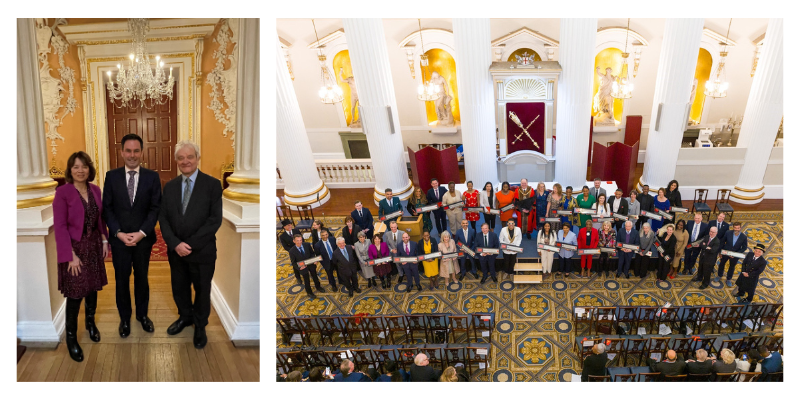
With the FT reporting how Sweden’s stock market became the envy of Europe a growing and sizeable community within the Square Mile are signed up to an agenda for change to ensure UK capital can effectively support growing and scaling UK innovative businesses including those in life sciences.
We will continue to work to do this and it's good to see that Innovate UK and the British Business Bank see the value in linking their agendas, as they did by signing an MOU last week.
Step up and create more inclusive workplaces within the biotech sector
With Deaf Awareness Week 2024 (6-12 May) fast approaching, the BIA has teamed up with its charity partner, RNID, to offer valuable resources and initiatives for creating more inclusive workplaces across the biotech sector.
RNID is challenging BIA members to compete in ‘Step Up for RNID - with the BIA' in May. Kicking off just before Deaf Awareness Week (6-12 May), teams can sign up to run, walk, swim, cycle or wheel to connect the BIA's headquarters in London with hearing research locations worldwide and raise vital funds to accelerate the development of groundbreaking treatments for hearing loss and tinnitus!
Register for the 2024 challenge and get your team together (of up to 10 people), pick a target destination distance from the list below and prepare to start moving from 6 May to help your team reach anything from 200 km to 5,000 km throughout the next four weeks (until 31 May).

